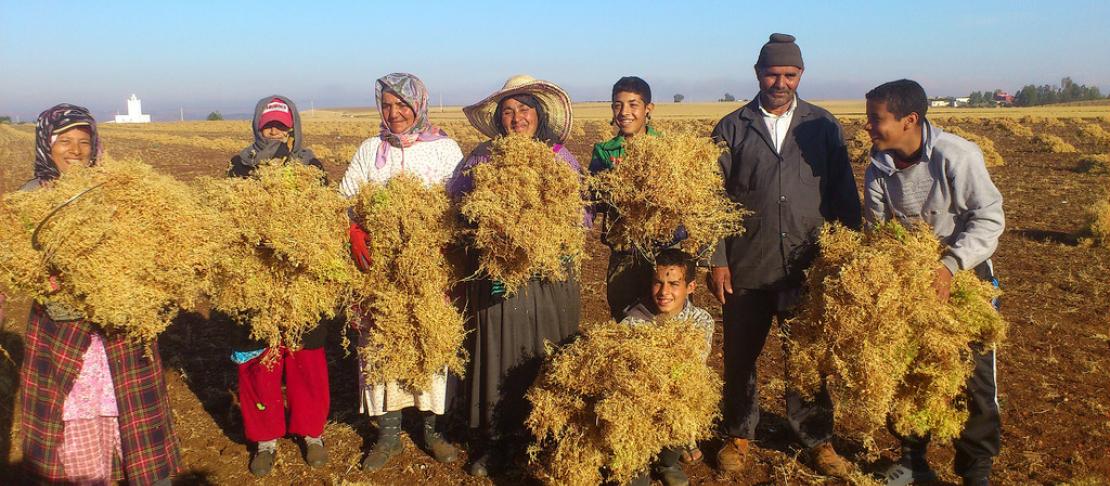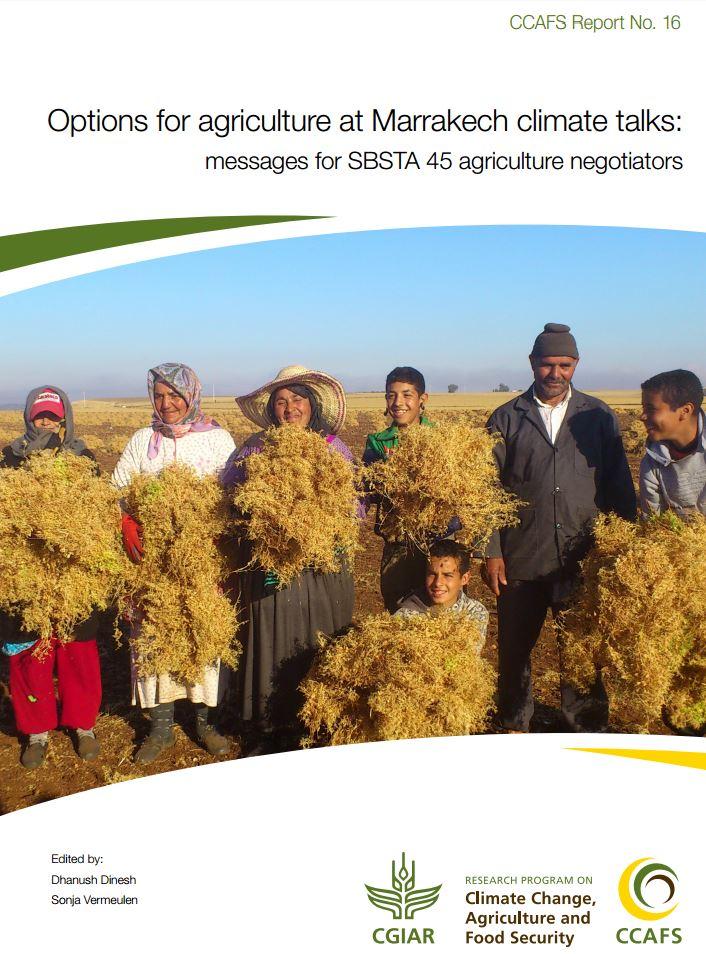10 options for agriculture at Marrakech climate talks

New guidance to help countries make crucial decision on future of agriculture under climate change
There is no question that action is needed to address climate impacts on agriculture while reducing greenhouse gases produced by food and farming. In fact the 2015 Paris Climate Agreement explicitly referred to food security, and a large majority of countries at the Paris climate conference showed their willingness to take action on agriculture. A major opportunity lies ahead, as a 5-year discussion on agriculture under the UN Climate Talks culminates at the November meetings in Marrakech. New guidance is now available to help countries decide how to shape the future of food and farming under a global climate agreement.
Since 2011, a United Nations technical body (known as SBSTA) has been deliberating issues related to agriculture, with many parties and observers making submissions, and debates continuing over several workshops on the topic.
To provide countries with the necessary knowledge base to make a decision in Marrakech, the CGIAR Research Program on Climate Change, Agriculture and Food Security (CCAFS) and partners have compiled a new report setting out 10 options that build on the latest submissions and deliberations by countries. Each option is elaborated with an overview, ways forward and pros and cons.
Download the report:
Options for agriculture at Marrakech climate talks: messages for SBSTA 45 agriculture negotiators
While the report does not promote any particular option, Parties to the UNFCCC can use the report to choose one or more options that correspond with their level of ambition, political priorities, and implementation arrangements and timelines involved.
Options to consider
Finance, capacity and technology for action. Several Parties have called for the agricultural sector to develop greater linkages with the finance, capacity, and technology mechanisms of the UNFCCC. The means to achieve such linkages and implications are explained within the report.
Mobilizing knowledge for action. Development of an agricultural knowledge and learning platform and/or a SBSTA work programme on agriculture has also been proposed by some parties. The report explains the modalities for implementing these options.
Helping countries take action. The report also explores the role that the SBSTA can play to support Parties in implementing the Nationally Determined Commitments (NDCs), which are relevant to the agricultural sector. These were put forward in December 2015.
Process for discussing mitigation. While SBSTA discussions on agriculture focus on adaptation, the discussion of mitigation co-benefits from adaptation interventions in the agriculture sector has remained a divisive topic. The report spells out the option for establishing a process for discussing the technical aspects of mitigation co-benefits arising from adaptation interventions in agriculture.
Support for Early Warning Systems. All parties agreed that Early Warning Systems are crucial. The report discusses the next steps involved in supporting their futher development.
Address agriculture from multiple venues. Addressing agriculture through processes outside the Convention (e.g. through other UN, international, regional efforts) and through existing processes of the Convention are also discussed.
From knowledge to action in South East Asia
The report is already being shared widely with countries to help them prepare for the Marrakech discussions. The key messages from the report were presented at a recent COP22 preparatory meeting of the Association of South East Asian Nations (ASEAN) member states, convened by the ASEAN Climate Resilience Network and hosted by Vietnam.
“SBSTA 45 is a crucial milestone for UNFCCC negotiations on agriculture, as we are at the culmination of a five year long process,” said Dr Chu Van Chuong, Deputy Director General of International Cooperation at the Ministry of Agriculture and Rural Development, Vietnam. “The agriculture sector is a priority for South East Asian countries, and we see elements of technology transfer, capacity building, finance, and knowledge sharing to be important components of a SBSTA decision. The CCAFS analysis of various options is useful as it gives negotiators a sense of the practicalities involved in implementing various options, together with their pros and cons,” he noted.
Dr Leo Sebastian, CCAFS Regional Program Leader for South East Asia said, “In South East Asia, we are collaborating with the ASEAN Climate Resilience Network to engage with ASEAN member states and help them address knowledge gaps as they take part in UNFCCC negotiations on agriculture. Such engagement efforts are an important part of the CCAFS work, and similar efforts are being undertaken in Africa and Latin America through the respective regional programs.”
While a SBSTA decision on agriculture could be a big boost for the agricultural sector as it adapts to the challenges posed by climate change, sound implementation of action on the ground is not without challenges. Mr Beau Damen, Natural Resources Officer - Climate Change and Bioenergy at FAO’s regional office for Asia and the Pacific noted, “In their INDCs, ASEAN member states have identified over 90 actions in the agriculture and land use sector. Implementation of these actions would require national level coordination mechanisms, support through UNFCCC frameworks, and through processes and organizations outside the UNFCCC”
Latin America also does its part
The key messages of the report will also be presented in the Latin American policy dialogue on agricultural and forestry issues under the UNFCCC, hosted in its third version by the Ministries of Environment (MINAE) and Agriculture (MAG) of Costa Rica, and the Ministries of Agriculture of Chile and Uruguay.
Dr. Ana Maria Loboguerrero, CCAFS Regional Program Leader for Latin America, said: "The vast majority of Latin American countries have shown their commitment to action on climate change prioritizing mitigation and adaptation in agriculture its INDCs. in CCAFS Latin America we have been supporting this policy dialogue on agricultural and forestry issues under the UNFCCC, together with other partners such as FAO, ECLAC and the French Cooperation, and we hope that this document is a key input in the previous meetings the appointment in Marrakech. Our colleagues are making similar efforts in Africa and Asia, through the respective regional programs."
There are many pathways to action within the UNFCCC, and Parties are encouraged to use this report to support negotiations at SBSTA 45 and decide on the best options to drive forward climate actions in the agricultural sector.
Download the report:
Dinesh D, Vermeulen S, Bacudo I, Baron DM, Castro-Nunez A, Hedger M, Huyer S, Iversen P, Laure A, Loboguerrero Rodriguez AM, Martius C, Neufeldt H, Nyasimi M, Richards M, Wollenberg L. 2016. Options for agriculture at Marrakech climate talks: messages for SBSTA 45 agriculture negotiators. CCAFS Report No. 16.
This report was produced in partnership with the ASEAN Climate Resilience Network, Center for International Forestry Research (CIFOR), International Center for Tropical Agriculture (CIAT), International Livestock Research Institute (ILRI), Land Use & Climate Change Company, Overseas Development Institute (ODI), World Agroforestry Centre (ICRAF), Women in Global Science and Technology (WISAT), University of Copenhagen (UCPH) and the University of Vermont (UVM).

